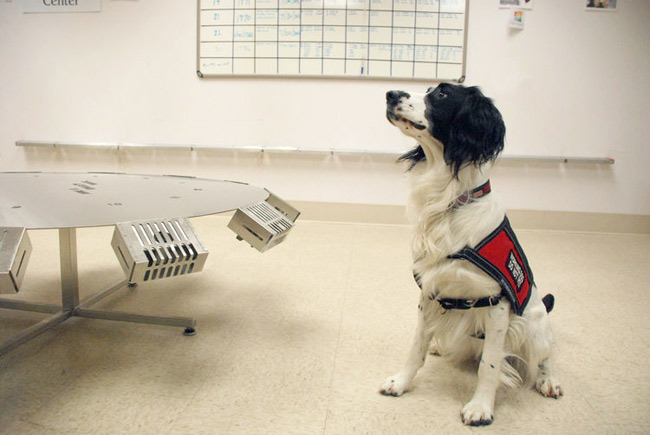
Ovarian cancer is called the silent killer because by the time most women get diagnosed, it’s too late. Most women mistake the symptoms for constipation. But now, dogs are sticking their nose in the middle of a groundbreaking study, and it could be the key to an early diagnosis.
When it comes to the sense of smell, dogs beat us out 10,000 to one.
Cynthia M. Otto, DVM, PhD, Executive Director at the Penn Vet Working Dog Center in Philadelphia exclaimed, “They’re unbelievable! They are so much better than us!”
That’s why doctors at Penn Vet teamed up with the Monell Chemical Senses center to study whether dogs can literally sniff out ovarian cancer.
Otto told Ivanhoe, “These dogs are woman’s best friend because we think they are going to give us the answers that will allow early detection of ovarian cancer and save lives.”
McBaine’s job is to pinpoint exactly what container holds the sample of plasma from cancer patients. And time after time, he passes with flying colors.
George Preti, PhD, Principal Investigator at Monell Chemical Senses Center in Philadelphia told Ivanhoe, “We may not have a dog scan as opposed to a cat scan but we will have an electronic nose hopefully developed to sense all the samples.”
The end goal isn’t to train thousands of dogs, but to create an electronic sensor that can detect the unique smell of ovarian cancer, and then use that to test thousands of samples quickly. Researchers hope these dogs will lead the way.
“They really do save lives but this is a totally new way to have that bond make such an impact,” Otto said.
Talk about being everyone’s best friend!
The dogs in the study come from esteemed lines of well-bred hunting hounds and police dogs. Generations of selective breeding have sharpened their noses and instincts to a razor-sharp edge. Labradors and German Shepherds are the top dogs at the center, but occasionally a golden retriever or springer spaniel — like McBaine — manage to make the cut. If you’d like to help keep this research study going, go to www.razoo.com and type in sniffing out cancer.
FOR MORE INFORMATION, CONTACT:Cindy Otto, DVM, PhD
Penn Vet Working Dog Center